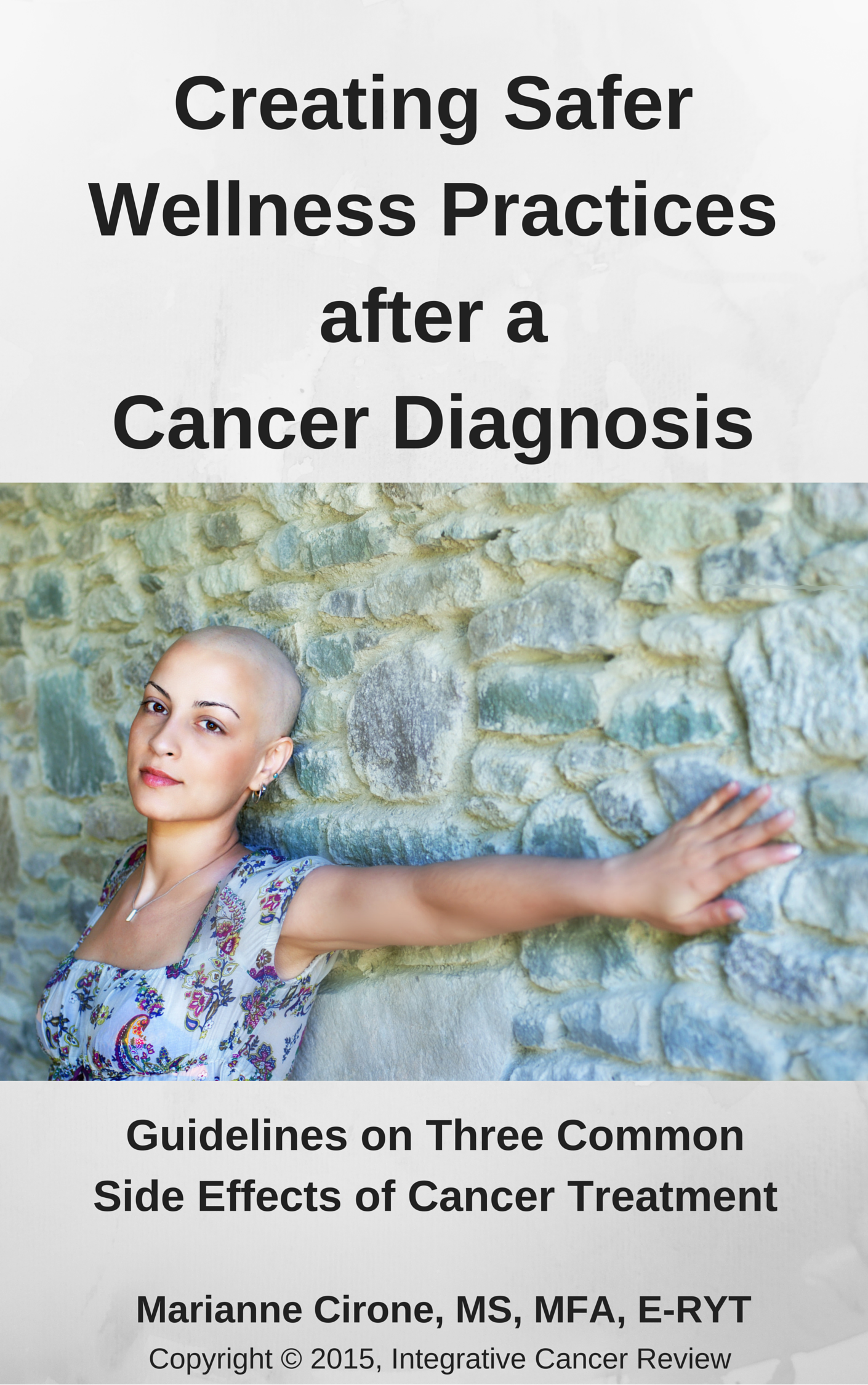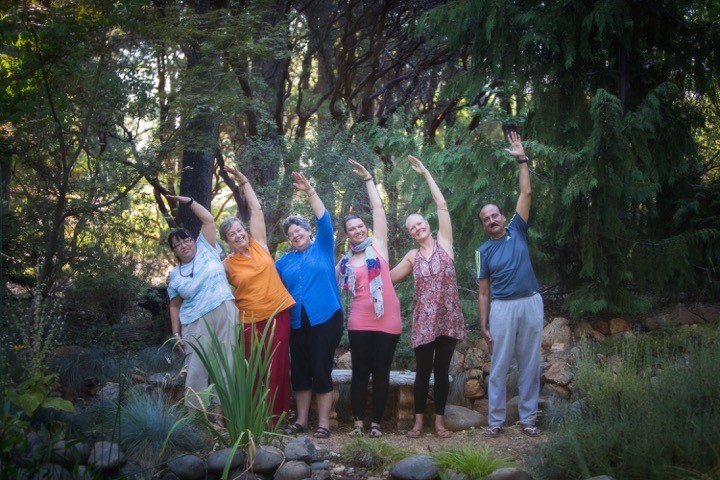
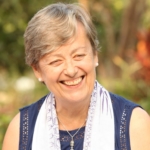 Lee Majewski is an IAYT-certified yoga therapist and cancer survivor who has turned her own cancer diagnosis into an opportunity for other cancer patients to benefit from her experience by creating intensive three-week retreats to support healing after conventional treatment ends.
Lee Majewski is an IAYT-certified yoga therapist and cancer survivor who has turned her own cancer diagnosis into an opportunity for other cancer patients to benefit from her experience by creating intensive three-week retreats to support healing after conventional treatment ends.
This is Part 1 of her 2 Part Article on how Yoga Therapy Retreats Empower Patients after a Cancer Diagnosis.
How did you first find the healing power of yoga?
I came to yoga without knowing that what I do is yoga. In late 1980s, I stumbled into meditation, which I think saved my life at the time. I started to meditate religiously, three times a day. At the same time I discovered my highly effective ability to heal with energy. I studied privately with a well-known healer, did Therapeutic Touch training, became a Reiki master and saw patients –all while I was a manager in a corporate world.
Fast-forward about ten years, and I found myself in a yoga ashram in Trinidad. At the time, I had no idea what an ashram was or what a guru was. I went there for a three-week invited visit and ended up staying 3.5 years, studying personally with a Kundalini Yoga master.
I would still be there if it weren’t for my breast cancer diagnosis, which brought me back to Canada. I went through full-fledged traditional treatment, which was so devastating that if it wasn’t for yoga, I would have simply checked out.
After my treatment ended, I found myself teaching yoga to cancer patients, to yoga enthusiasts and to youth with mental challenges. I noticed that everyone benefited and felt much better after doing my asana classes for some time. This confirmed my conviction that yoga has tremendous therapeutic potential and I decided to come to India to find out more from the horse’s mouth, so to speak. This is how I landed at Kaivalyadhama Yoga Institute in India to study. As life would have it, before I finished my studies, I created and started to run the Rejuvenation Retreat for Cancer Patients and then the Chronic Cures program at the Kaivalyadhama Yoga Institute.
Today, I am an IAYT-certified yoga therapist (International Association of Yoga Therapists), and work in Kaivalyadhama Yoga Institute as the Senior Yoga Therapist. I also travel around the world, teaching teachers what and how to teach yogic techniques to cancer patients, offering workshops and Rejuvenation Retreats for Cancer Patients.
Lee, how did your own experience with cancer lead you to create the Rejuvenation Retreat for Cancer Patients at the Kaivalyadhama Yoga Institute in India?
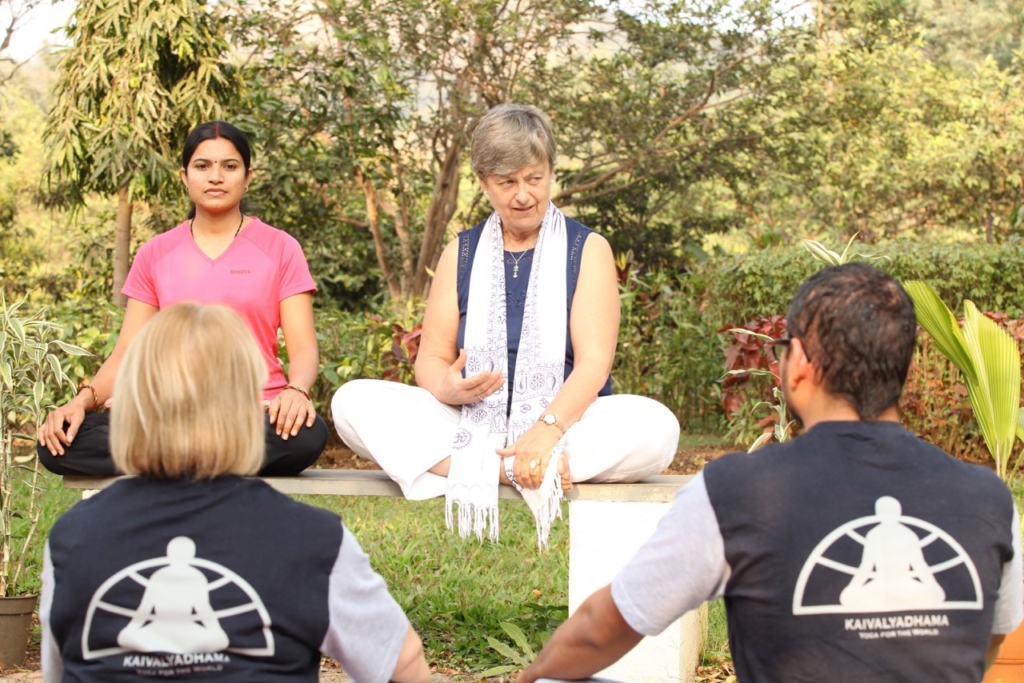 The idea started as a possible research project on yoga and cancer. This required a protocol, which came to my mind when I remembered my own experiences with a gap in cancer treatment in Canadian health care system. I also was determined to use ALL yoga tools, not to limit myself only to asanas (postures) in designing the protocol, as I knew that most of the research so far was done only either on asanas or on meditation.
The idea started as a possible research project on yoga and cancer. This required a protocol, which came to my mind when I remembered my own experiences with a gap in cancer treatment in Canadian health care system. I also was determined to use ALL yoga tools, not to limit myself only to asanas (postures) in designing the protocol, as I knew that most of the research so far was done only either on asanas or on meditation.
Typically, after surgery cancer patients undergo chemotherapy and radiation, which may last from four weeks to a few years. Often such intensive treatments result in severe side effects – mental and physical fatigue, cognitive dysfunction (brain fog), depression, mental confusion and loss of short-term memory.
Such was my case. At the end of my treatment in 2008, my body was completely exhausted and my mind was shut down. I couldn’t focus enough to read a paragraph in the book. I was severely depressed and I had no awareness of it. I was fatigued, and strangely, had no short-term memory. I was wondering – how am I going to live the rest of my life? When my oncologist said to me “this is the end of the treatment – we did everything we could for you. Now it is time for you to live your life again!” I looked at him and wondered – WHAT LIFE?
I remembered my husband’s ordeal. After going through triple bypass he was released home in four days, which was followed by six months of intensive therapy. I realized that there is a great gap in the healthcare system, which drops cancer patients at the end of treatment – when they feel the worst and need the most support and information on how to recover.
The end of the treatment means usually accumulation of toxicity in the body, which results in most severe side effects. The treatments are long and the side effects creep in on us very slowly, and so we often have very little awareness of our state. No wonder that over 80% of patients suffer from depression after ending their treatments. We felt terrible for a long time and we do not know if/when we will feel any better…
My presence at the Kaivalyadhama Yoga Institute in India opened an opportunity to fill this gap by creating a comprehensive program based on yoga principles. Thus, I created the Rejuvenation Retreat for Cancer Patients in 2013, a program which picks up patients at the moment when they are at their lowest–after finishing the treatments. We have been running these retreats for four years now–with wonderful effects. My mission now is to take these retreats out of India and make them available in other countries.
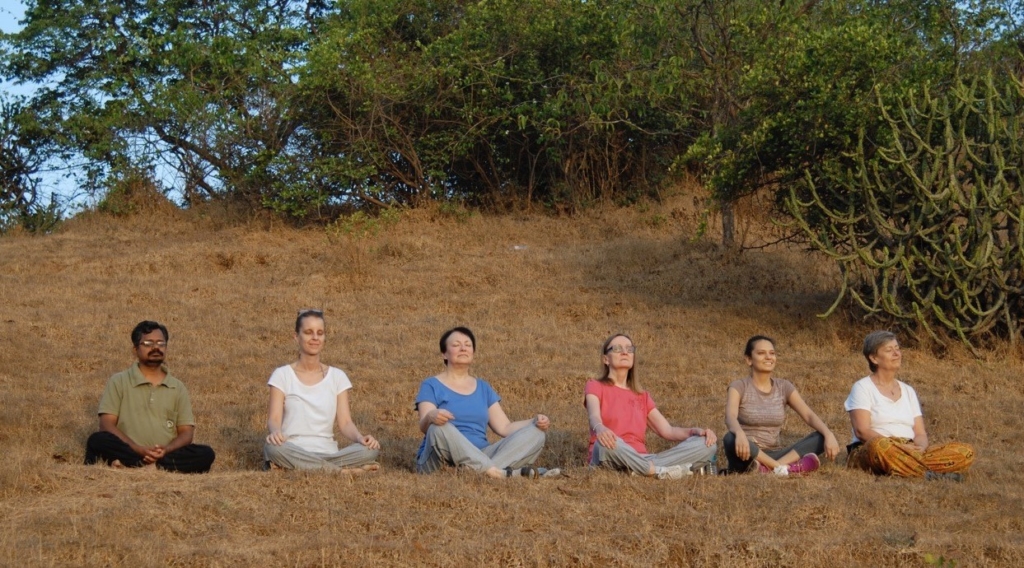
Can you tell us more about your retreats for cancer patients and survivors?
My intention was to fill in the gap in health care for all in need. This meant for all cancer patients in all stages of cancer. Because there is such a wide variety in cancer cases and because yoga therapy lends itself to highly individual approach, we limit the number of participants in a given retreat to a maximum of 8 at a time. We designed a very comprehensive protocol, with six days per week of yogic practices, including the following each day:
- 1 hour of gentle asanas
- 1 hour pranayama (breath management techniques)
- 1 hour meditation
- 1 hour Yoga Nidra (deep relaxation)
- 30 minutes of chanting
- 5 hours of lecture or group work
- 30 minutes of yogic counseling upon request
We accept patients with all cancers at all stages, providing they can move about independently. Most of them are coming within 12 months after finishing treatments. Most of them also are coming with severe side effects of chemotherapy and radiation – high level of tension, depression, anger, fatigue and anxiety, and with an attitude of victim well entrenched in them by healthcare system. So, there is a need for a high level of individual support.
The retreat is residential – one stays and works together in the same small group for three weeks, which in itself becomes a therapeutic tool.
Typically, we spend the first week helping patients to settle into the routine of the day. By the end of first week or the beginning of the second, depending on the patient’s earnestness, we see them going through some kind of crisis. The yogic practices start working, and their pain connected to treatments and the fact of having cancer is coming out. Their long-held negative emotions are coming out. Their rigid attitudes are challenged. They are forced out of their established comfort zones to where they have to face themselves.
We help them to meet such challenges by teaching them appropriate yogic practices and by supporting them with counseling sessions. We hold the space for them, so that they can feel supported in meeting their inner challenges. We help them to reconnect with their bodies. We teach them yogic tools to deal with their strong negative emotions. We help them to become aware of their routine negative thought processes and teach them how to change them.
The second week is the week of intense spiritual work, and inching from victimhood to empowerment. As all the classes are held in a group setting for the three weeks, the patients also watch each other going through this process, knowing that they are not alone! They can observe others progressing through the second week tribulations and the group becomes a very strong support and encouragement system for everyone. People open and the deepest desires and pains are shared freely in the group. In this environment, the true healing happens.
The third week usually is marked by considerable change in patients’ attitude and mood. The emotional, mental and spiritual work that they did in second week, as painful and difficult as it was, now makes them feel empowered and strong. They now feel that their health depends on themselves, not on their doctors. Their enthusiasm for life replaces hopelessness, depression and anxiety. Their energy levels are raising and the hope and acceptance of their lot is apparent. They begin to feel powerful and motivated to continue with yogic practices after going back home. Their minds are now focused on boldly looking forward and planning how to change their lives to live healthier and longer.
As one of the stage 4 colon cancer patient said to me at the end of program – “I was just trying to survive long enough to come to this program. Now, I am going back home looking forward to a new life.”
Typically, we see patients coming from the health care system feeling completely disempowered. Upon completion of the retreat, patients are able to take full responsibility for their health and choices they make in everyday life. That gives them tremendous energy to look forward to a new life.
How is the yoga program that you have designed for people diagnosed with cancer different from other yoga programs?
Usually the yoga classes offered for cancer patients are free of charge, conducted by wonderful people who have a lot of good will, but who do not necessarily understand the problems patients encounter during and after cancer treatment. These classes typically are limited to gentle asanas, offered once or twice a week. These are good, but the effect is limited, especially if the tools used are limited to asanas.
Our programs differ in many ways. It is a very comprehensive protocol, which uses all elements of yoga, not only asanas, and takes people from Day 1 to Day 21 in systematic way. We use all yogic elements to work not only on the body, but more importantly, we work on emotions and the mind. We want to address the causes of the diseases, not only the symptoms. We help to recognize carcinogenic thoughts processes and give tools to learn to change and manage the mind. We help to resolve or release the negative emotions stored somewhere deep down, which also contribute to the disease.
But most importantly, I believe this program moves people–in 21 days– from victimhood to empowerment, helping them to feel “in charge” of their lives. This, in itself, is a tremendous change in life attitude. We also spend a lot of time on educating patients on carcinogenic factors in their diet, lifestyle and environment. Finally, we help them to examine their old belief system and create a new, healthier one. I believe there isn’t any program like ours at the moment – which is a pity, as there is a great need for it.
How do you work with the medical community?
This is rather unfortunate, but I have to say that so far I have been unable to work with the medical community. Their acceptance of “yoga” is generally limited to one hour asana classes, but there is no acceptance of the comprehensive yogic program aimed at specific need. It is too bad, as the gap in cancer care is huge and the need is great. This program has proven to be very effective for the end of allopathic treatment, in terms of helping people to “pick themselves up” and start a new life.
We are doing an ongoing research. In December, 2016, we published Effects of an Intensive 3-Week Yoga Retreat on Sense of Well Being in Cancer Survivors in the Journal of Alternative Medical Research. We also published in www.ym-kdham.in: Yoga Mimamsa, Vol.46/Issue 1&2, Jan-Jun 2014. We also have one more study publication in the works.
There seems to be inherent distrust in medical community once you start talking about “yoga therapy retreat for …” as a package. The individual “yoga” (read: asana) classes twice a week are okay, with much research to back the effectiveness of these programs, but when you propose a comprehensive program “for XYZ,” the medical community steps back and wants more proof.
At the moment, regarding our specific program, I can give them our preliminary studies with excellent results. However, I can see the proof in the faces of our attendees before and after the retreats, but hopefully with time, we will have more research published to bring our work to visibility in the medical community.
In India, now I work with Advanced Centre for Treatment, Research and Education for Cancer, which seems to be very progressive as far as yoga is concerned. We are now providing a two-hour protocol, three times a week, for their hospital long-term patients. One day, I am hoping to be able to extend this cooperation to include offering our Rejuvenation Retreat there.
What are your plans for the future with your programs?
Our Rejuvenation Retreats for Cancer have been so effective that we have created a sister program called the Restore! Retreat for Psychosomatic Chronic Diseases. This retreat is based on the same principles and helps patients with cardiovascular diseases, diabetes, depression, psoriasis, and many other diseases caused by stress and destructive lifestyle. We have been conducting them for the last three years with equal success – by addressing the core causes of the problem, which then reduces symptoms.
Now my mission is to take our cancer program to every country and make it available at every major cancer center. We are at the very beginning. I am still struggling with a viable self-sustainable business model as our charges for these programs are quite low. I am also looking for yoga therapists to train as champions to develop these programs in their respective countries. The manual is being translated to Polish, and by 2018 I am hoping to offer it for the first time in Europe. But we have already started to offer this outside of India. In July 2016, we ran the program at Ananda Meditation Retreat in Northern California, and in January 2017, we will start in Australia at the Rocklyn Yoga Ashram in Victoria. Canada is beginning also to appear on the horizon… the future is very exciting!
See Part II of this article: Healing Yoga Retreats after a Cancer Diagnosis

